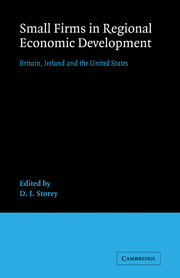Book contents
- Frontmatter
- Contents
- List of Contributors
- 1 Introduction
- 2 Manufacturing employment change in Northern England 1965–78: the role of small businesses
- 3 New firms and rural industrialization in East Anglia
- 4 Spatial variations in new firm formation in the United Kingdom: comparative evidence from Merseyside, Greater Manchester and South Hampshire
- 5 An industrial and spatial analysis of new firm formation in Ireland
- 6 Innovation and regional growth in small high technology firms: evidence from Britain and the USA
- 7 Regional variations in capital structure of new small businesses: the Wisconsin case
- 8 The world of small business: turbulence and survival
- 9 The implications for policy
- Index
2 - Manufacturing employment change in Northern England 1965–78: the role of small businesses
Published online by Cambridge University Press: 25 October 2011
- Frontmatter
- Contents
- List of Contributors
- 1 Introduction
- 2 Manufacturing employment change in Northern England 1965–78: the role of small businesses
- 3 New firms and rural industrialization in East Anglia
- 4 Spatial variations in new firm formation in the United Kingdom: comparative evidence from Merseyside, Greater Manchester and South Hampshire
- 5 An industrial and spatial analysis of new firm formation in Ireland
- 6 Innovation and regional growth in small high technology firms: evidence from Britain and the USA
- 7 Regional variations in capital structure of new small businesses: the Wisconsin case
- 8 The world of small business: turbulence and survival
- 9 The implications for policy
- Index
Summary
INTRODUCTION
This paper examines the contribution to manufacturing employment change of small and medium sized enterprises (SMEs) in Northern England – an area which has experienced persistently high rates of unemployment for more than fifty years. The region has also been a recipient of almost every initiative introduced by national government to create employment, and whilst there have been periods of modest success the relative position of the Region has remained virtually unchanged during this half century.
In this paper a small business is defined as having less than 200 employees, although it is recognised that the problems and priorities for a well established business with 180 employees will differ markedly from those of the two-man business. Yet this heterogeneity is characteristic of the small firm sector and the main distinction to be made in these pages will be on the basis of age, i.e. between the new and the well established small business.
The first section of this paper documents the importance of SMEs in the Regions of the United Kingdom, but it then concentrates upon changes in employment in the three counties of Durham, Cleveland and Tyne & Wear which in 1978 contributed 78% of manufacturing jobs in Northern England. Having outlined the data sources to be used, the remainder of the paper is devoted to a detailed study of employment change, with particular emphasis upon the performance of SMEs.
- Type
- Chapter
- Information
- Small Firms in Regional Economic DevelopmentBritain, Ireland and the United States, pp. 6 - 42Publisher: Cambridge University PressPrint publication year: 1985
- 12
- Cited by



